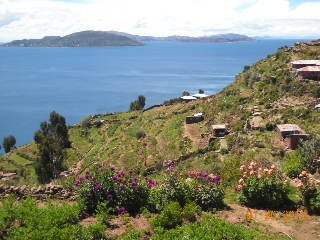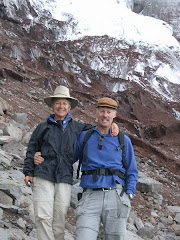
Welcome to Taquile Island....a 3 hour boat ride from Puno. Our friend, Dra. Paula, is a young dentist who goes to the island once a month as a volunteer to give dental care at their Puesto de Salud. Her friend, Hugo, is the local physician there. It is the first dental care they have received, so you can imagine how busy she is. Our dental team in March will be spending two days here to help.
It is an island that reminds us of Greece and the Middle East. There are no cars, no dogs, no electricity (except solar panels), no running water. There is an abundance of sheep, gardens, preserved local Quechua culture, and friendly smiles.

On Taquile the women all spin yarn and the men knit. The men use 4-5 very small needles to create the finely knit gorgeous hats they all wear. The hats that are all red signify they are married, if they are both red and white, they are single and available!
We came with a group of young professional women with whom we are collaborating.
Wilma is a dynamo presenter; here on nutritional needs of infants and toddlers.
We are so pleased to have met these young women who are also collaborating with our Methodist healthcare educational training.
They are so bright, fun, and well-received by both the men and women on Taquile.
Wilma's audience....mothers who have walked from various parts of the island. Although initially very shy, they gradually opened up. Very conservative traditions persist on Taquile. Women generally walk behind husbands, sit at the feet of their husbands at public gatherings, and do not have much of a voice. Things are gradually changing.

Although tourists come here daily from Puno, very few stay the night. The dental team of John Kriz and Jill/Dave Wagers will have the opportunity to stay overnight with us in March and work with Dra. Paula and Dr. Hugo. Here is where we will stay....definitely not a 3-star, but an opportunity to experience their life here.
As we passed these three children laden with the greens they were taking to their sheep, a little voice said in clear English..."Welcome to Taquile." The oldest girl on the right was learning English in school and was eager to practice.
We appreciate having the time to meet so many people. We are learning so much from them...little pearls of wisdom dropped in our path.
Under yet another arch before our departure back to Puno. Paola, the dentist, is in the white jacket; Velma, the biologist, is in the white hat; Wilma, the nutritionist, is in the green sweater, and Lucy, coordinator of "Junto" collaborative women's training program is in the blue jacket. Those of you joining us on teams from Boise FUMC will probably meet some of these well-trained, kind-hearted, and dedicated women.
They are a blessing!
















